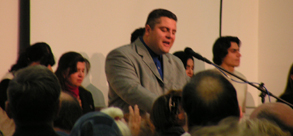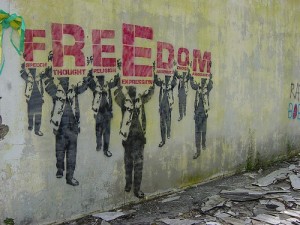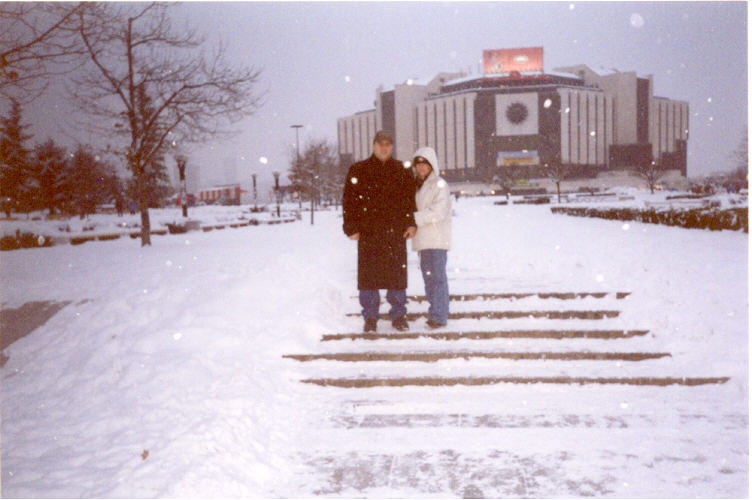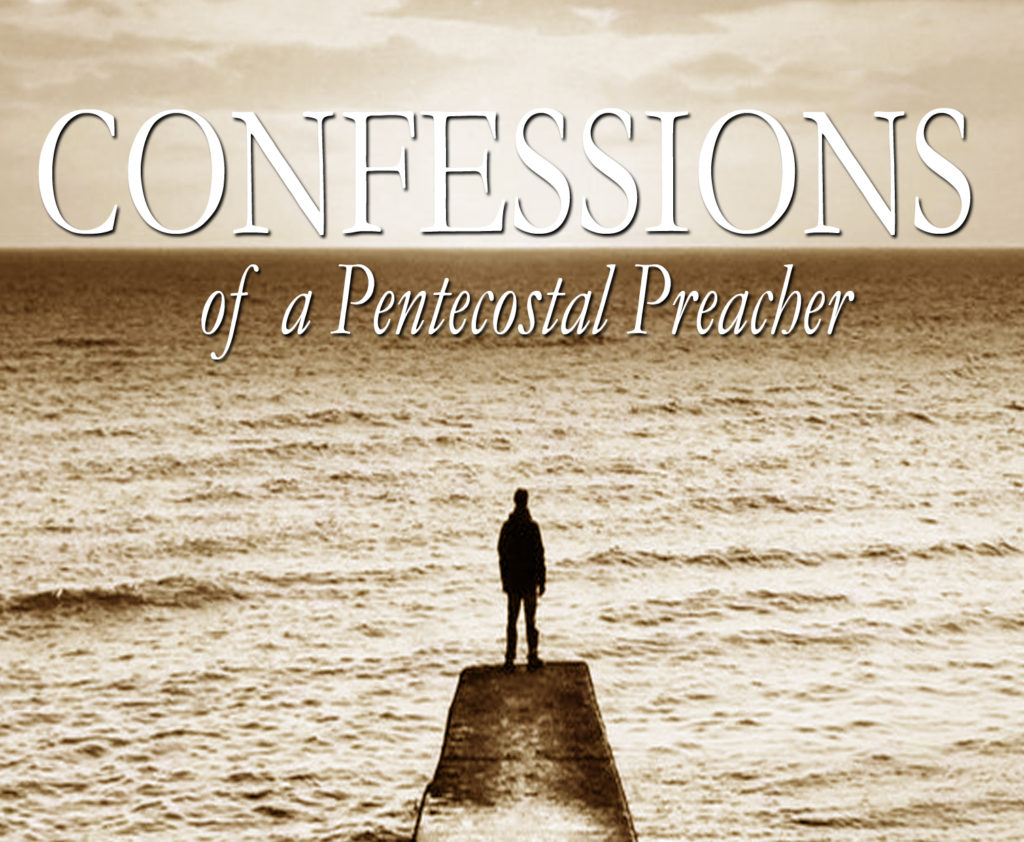The Central Church of God Ministry Center in Sofia (Bulgaria) Today
At the end of each year, we have made it a tradition to share the projects completed in the past months of hard work and labor for the Kingdom. But as we are approaching now 20 years of ministering and teaching with the Church of God denomination together, we have decided to recall some more long-term projects.
Exactly 20 years ago, my wife landed in Sofia, Bulgaria for the first time on a snowy December day. In fact, it was so cold that my mother worrying she would be coming from a much warmer subtropical climate, bought the biggest winter jacket she could find, so we could wrap her with it on the way from the airport. Not the most glorious meeting or welcome party as I recall it today.
I was eager to show her my Church, the Bulgarian Church of God, then second to none in the country with 32,000 membership strong and 400 congregations. Many of them newly started and 28 of them in the two-million people capital alone. The Central Church of God in Sofia, where I preached and ministered in 2001-02, had almost 1,200 people at that time. Its main meeting place was the multifaceted Church of God Ministry Center in a prime location in the growing European capital – a project we had undertaken in 1998 with the faithful will and support of some two dozen Church of God congregations from Florida. The documents from my personal archives tell the story best:
December 2, 2001 – I had just returned from Romania bringing with me World Missions Director Lovell Carry and Field Director (Central/Eastern EU/CIS) Dieter Knospe. They were in Bulgaria on a special visit to transfer the new building to the ownership and operation of the Central Church of God in Sofia per the contract signed with our overseer in the Spring of 2001.
The days of Ministry Weeks 17-19 that followed in December, 2001 and which my wife recorded here: https://cupandcross.com/2001/12/ are excruciating to even remember today. Sunday service with Sunday School and preaching, then again on Tuesday, Wednesday and Thursday. Then special Saturday services in Pravetz and many other places. Similar schedule plus the traditional celebration services in the following Christmas week. Repeat again for the New Year’s week. And all of these done in extremely cold weather and tons of snow on the ground – so much that my wife was delayed for days leaving for the States mid-January with all flights out of Sofia cancelled as the ice never melted enough to clear the runway and defrost the airplanes.
And all through this, the building never stopped. Regardless of all difficulties, we were all working eagerly and anticipating greater results. The multifaceted Church of God Center in downtown Sofia was to encapsulate all our ministries and many more, giving our young freedom generation the opportunity of a lifetime to make a difference for the Kingdom…
Today, when the building of our Ministry Center is being sold and it will be used for something the will of the donors never intended it to be, our Church of God denomination in Bulgaria is split to no less than 12 fractions all registered since 2005. All of them still carry a variant of the Church of God name and consist of the same people I grew up with under the Communist Regime of Bulgaria. We were promised a democratic leadership formed by indigenous people, but instead ended up with mini-bosses, regional micromanaging oversight, multiple splits and everything that characterizes a very typical colonial type of missions.
With the church organizations split time and again until torn into pieces, many of my peers chose alternative paths. Some left the ministry, others were hurt or divorced, a few even died and many simply gave up and moved on. With the rest, I have an appointment at the End of the World!
But none of this gives any pleasure or satisfaction to share. Especially when reminded that the dreams we all once dreamed are now hang on the willow trees by the rivers of Babylon. When reaching those waters of deeply troubled cross-cultural crises of faith and conviction, all bridges to people have sunken with no hope to recover again. God’s Kingdom has no gain in any of this!
Our prayer has hence turned into a prophetic protest for a new reality – not merely for a new mission paradigm, but one of a whole new mission… A Spirit-led ministry that forgoes all man-made politics and business-like models, but instead aims to build a New Church that is nothing less than the very cross-road where we encounter God and others in the Spirit of Pentecost.
CONFESSIONS of a Pentecostal Preacher
To Mark Alan
We know not why good people have to die,
but we do know we must tell their story…
Chapter I: Beyond the Church and into God
Be without fear in the face of your enemies.
Be brave and upright that God may love thee.
Speak the truth always, even if it leads to your death.
Safeguard the helpless and do no wrong.
That is your oath.
~Kingdom of Heaven (2005)
Separation of church from politics of false religiosity
The phone rang heavy and long. It was 4 AM in Bulgaria, but I was already up. A friend on the other end of the line was calling from South Carolina with a warning of some bad situation. The following morning, I was going to be contacted by the Director questioning why we were ministering in churches outside of our denomination.
The truth was we had ministered in some 300 local churches across the Balkan country of Bulgaria crossing all denominational boundaries and gathering youth from just about every confession. God had used us not only to reach and minister and to lead, but to step into an untouched spiritual realm, to undertake an unfamiliar ministry paradigm and to approach a brand new dimension of reality where He was to be the center of it all. And we had obeyed without questions. Now it was time to pay the price!
* * *
Our denomination, the one to which I remain both critically loyal and loyally critical, spreads over some five generations. Through its century old existence, the struggles and tension between theology and praxis has been in the center. And there, in the very essence of Pentecostalism itself, while some are always celebrating and being celebrated in the office or temple, others are always pushed in the periphery of normal life, hidden from the world behind closed doors and seeking a much deeper experience with God.
These modern day mystics are not only forgotten, but often forbidden. For their riot for righteousness cannot be conceived, contained and controlled by the religious norms of organized officiality. They speak as prophets to a world they so fervently try to escape from, about a reality that does not exist in the normal believer’s mindset. A stage of spirituality that cannot be preached without being lived in the social existence. And a relationship of God that goes far beyond common relationism and into God himself. That God, Who does not abide in offices and temples, but on the cross outside of the city walls…
But I knew nothing of this until that cold winter morning when the phone rang through darkness of the night. Knowing what is coming, rarely changes what we have done to get here.
7 Years in Bulgaria: CONFESSIONS of a Pentecostal Preacher
by Dony K. Donev, D.Min.
Upcoming Releases for United States (October, 2020)
Services at the Central Church of God in Sofia
 We returned from yet another exciting trip to Sofia where we ministered at the Central Church of God with pastor Pavel Ignatov. After a six year building program, the church is now equipped with a new multifunctional center. Although this is not our first service there, we were amazed again how the new building enhances the ministry of the church through its multiple ministry applications.
We returned from yet another exciting trip to Sofia where we ministered at the Central Church of God with pastor Pavel Ignatov. After a six year building program, the church is now equipped with a new multifunctional center. Although this is not our first service there, we were amazed again how the new building enhances the ministry of the church through its multiple ministry applications.
To begin with, the location of the new worship center is close to downtown Sofia. This is important because as the capital of Bulgaria, the city has experienced an escalated growth in the past ten years reaching a population of over two million. The Central Church of God is conveniently located at the very heart of the metropolis as at the same time it is close to the main roads, which can easily lead to the city loop and out of the city.
The convenient setting provides for a multitude of ministries. For example, the social center in the new building daily provides lunch for a large number of elderly people whose pensions of a limited amount are not sufficient for all expenses of a life in the big city. The food is delivered to them fresh at the same time every day and is free of charge.
The church’s center is also used for a number of conferences and church leadership meetings. Just in the past several weeks along with the regular services, they have completed a revival, Christian Advocates conference, youth rally, ministerial training course, national advisory meetings and a great number of weddings (normal for this time of the year in Bulgaria). The congregation is currently planning a nationwide evangelization meeting for the beginning of November.
The service we held at the Central Church of God was encouraging for us. At first, the large auditorium with over 1,000 seats looked a bit empty due to Sofia’s main streets being blocked for a city marathon. Yet, soon after the worship team began, the auditorium filled up as people continued to arrive until the end of the sermon. At the end of the service, we asked the congregation to join us at the altar and pray with us a special prayer for the unity of Bulgarian Pentecostals. The final benediction urged the church that revival must go on, but this would only happened if the people of God stand as one.
The Church in Central Europe: Not Prepared for Freedom
 David Machajdik and Juraj Kusnierik
David Machajdik and Juraj Kusnierik
The mid-1980s saw some Christians in some local churches starting to speak about and “do” evangelism. The climate in society was changing. It became possible to share one’s faith in a secular environment. People from a completely atheistic background became Christian. It was not a mass movement, nor was it a “national revival.” The only possible (and still today probably the best) method of evangelism was sharing one’s life—including one’s relationship with God—with friends and relatives. All this was done informally, sometimes secretly. The word “ministry” with its spiritual connotations was as yet unknown.
Then came the revolutionary changes in 1989. Christians “went public.” The first (and at the same time the last) big evangelistic events took place. Famous evangelists visited Eastern and Central European capitals. Mission organizations supported by local churches started to do “street evangelism.” Religion was given air time on radio and television. Foreign missionaries arrived. It was only natural to expect a great growth in the church. However, this growth has not taken place. People see the church as important and as a useful component of society, but they themselves do not want to be under its influence. After the initial enthusiasm was over, the church somehow “faded out.” It is still there; it is surviving, but not growing very much.* The reasons are many. We are able to perceive and comment on only some of them.
The Church was surprised by the complexity of the free world. After 1989 Christian leaders did not have much to say about issues discussed in society such as nationalism, business ethics, or the role of the state. Even topics frequently discussed by Christians in the West (such as abortion, ethics, social involvement, or education) were new to the church in post-Communist countries. During the first years after the change of regime, leading personalities in the church did not see these issues as important. They thought that preaching the message of personal salvation did not need to take a new context into consideration. The Gospel was thus unintentionally reduced to a set of slogans without any connection with the complex reality of life. Methods learned from nineteenth century revivals did not always work in a post-Communist society.
Gaps in theology were patched up by fervent activism. Only a handful of English or German speaking pastors had limited access to theological literature and even that was more on a popular level. Classical works of systematic and historical theology were not available. There were big and significant gaps in theology as a result of forty years of atheistic socialism. Problems arose when a lack of theological insight was perceived as a virtue. Weakness was called strength. Theology was seen as a useless intellectualism, leading one to confusion. Many activities were going on, but superficiality was often their common denominator. Religious programs on television are easily recognizable by their naiveté, simplicity, superficiality, and cultural weirdness. They are also very boring. They do not usually have much to say to the ordinary skeptical Central European even if he or she is searching for truth and the meaning of life.
The Church in post-Communist countries has been burdened by its unresolved past. The great majority of Christians living under Communism were apolitical. That meant that they did not openly criticize the totalitarian regime in which they lived. They very rarely supported or had any relationships with dissidents. Some church leaders tried, with varying degrees of success, to win more freedom for their churches by a “controlled collaboration” with the Communist regime. An example of this was that some signed statements rejecting the demands voiced by any given dissident movement, even if they were usually convinced that the truth was on the side of the dissidents, in order to gain greater freedom for various ministries in their churches. It is difficult now to judge these acts. The Church has not as yet gone through the process of reflecting on its activities under the Communist regime. It is awkward now to speak about a life of truth, about ethics, or about a radical rejection of evil. It makes it very difficult to react to accusations of compromising behavior on the part of the church and its leaders.
An inferiority complex fostered a small view of God. Many Christians, when they entered the “public arena,” were embarrassed by the questions they were asked. People who did not take Christian assumptions for granted asked questions which Christian activists, whose message was “Jesus is the answer,” were not able to answer. To avoid this embarrassment, they did not give space for dialogue and swept unpleasant questions under the carpet. A strange kind of inferiority complex has developed: those who in theory believe in an omniscient and omnipotent God, those who in theory boldly proclaim that Christianity has all the answers, in practice are afraid of questions. Jesus is viewed as loving, compassionate, and pious. He is not very often seen as the most intelligent person who ever lived.
Evangelical churches remain inaccessible. Like a hangover from the previous regime Evangelical churches remain locked up and fenced in. Only the initiated can find their way around. To outsiders, churches are practically inaccessible. It is no surprise that in some smaller towns or villages strange rumors are spread about bizarre religious rituals which take place behind closed doors. Shortly after the fall of Communism we were putting up posters in the streets of Bratislava, advertising a public evangelistic meeting. A young Gypsy stopped by and asked us about other similar events. He was very much interested, but only until he found out that sexual orgies are not part of the program. For him Evangelical fellowships had that connotation.
The Church is distant from its cultural and social environment. This might be a residue of the fears inherited from the times of Communism, when Christians were afraid of spies and secret police. It could also be based on a subconscious, but often correct, assumption that if they enter into an authentic dialogue with non-Christian fellow citizens, they will not be able to give meaningful answers to their questions. They know Jesus is the answer, but they do not know what the question is. The Church has a tendency to accept the role imposed on it by the expectations of society. It then becomes a social institution, aimed at the development of ethics and charity. It loses sight of its ultimate goal, which alone gives meaning to its existence: to know God as the creator and the one giving meaning and purpose to the whole of life.
Eley: Central Church of God, Sofia
For the last ten years the Central Church of God in Sofia, Bulgaria has been enjoying the ministry of an instrumental ensemble by the name of Eley (Anointing). The members of Eley have given their best and sacrificed greatly to provide the church and its outreaches with their ministry of praise and worship. Through the years they have recorded several Gospel albums, which have become a national event, not only for Christens, but for all Bulgarians. Recently, Eley was given an unique opportunity to host a TV Gospel music show for the Sofia TV channel NTV. The show contains discussion of various topics, a number of songs from Eley’s albums and a Gospel music educational segment. Eley has been able to use this opportunity as a tool for evangelism, as often they host the show in the streets of Sofia performing before great crowds. Cup & Cross Ministries International is proud to be an active partner and supporter of this endeavor.









